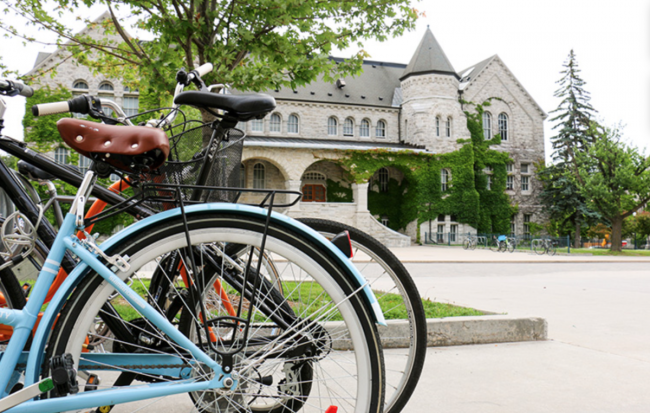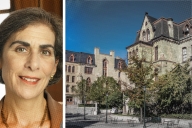You have /5 articles left.
Sign up for a free account or log in.

Queen's University
Queen’s University in Canada is blasting an anonymous report alleging that some of its faculty members are faking being Indigenous.
“This document was not commissioned or approved by Queen’s University in any way,” the Ontario institution said in a statement. “We reject the anonymous document in question, which is misleading and contains factual inaccuracies including some genealogical information of individuals named in the document.”
Some say the university’s take on the mysterious report, which appeared online last week, leaves something to be desired.
“As an Indigenous faculty member at @queensu I have concerns about the sharing of anonymous documents circulated about allegedly ‘pretendian’ faculty here,” tweeted Robert Way, an assistant professor of geography and planning who is of Inuit descent, for instance. “However, the response from @queensu also does not address the real concerns of those who believe this issue is widespread.”
Late Monday, a group of Indigenous scholars including Kim TallBear, associate professor in the University of Alberta's Faculty of Native Studies, released a statement on identity and institutional accountability. "While we may have differing opinions of such a report," it says, referencing the Queen's document, "we stand unanimous in asserting that there is a larger issue here that Queen’s, along with many other academic institutions in Canada, blatantly refuse to address -- that is, their legal obligations to First Nations, Inuit, and Métis communities (whose rights are affirmed and protected under section 35 of the Constitution Act, 1982) to develop transparent policies and procedures regarding the equity hiring of First Nations, Inuit, and Métis faculty."
This is far from the first time that white academics in Canada or the U.S. have been accused of adopting other ethnic identities, presumably to increase their clout in certain disciplines or access resources available to historically underrepresented groups, or both.
Just last month, The New York Times Magazine published an incriminating look into long-standing allegations that Andrea Smith, a professor of ethnic studies at the University of California, Riverside, is not Cherokee. Smith didn’t respond to the Times or to a request for comment Monday, but she’s always maintained that she is Cherokee.
Before that, within the last year alone, neuroscientist BethAnn McLaughlin admitted to pretending to be a Hopi scientist on Twitter, and historian Jessica Krug was outed as pretending to be Afro-Latinx. Historian Kelly Kean Sharp resigned suddenly after it was revealed she isn’t really Chicana, and Ph.D. candidate CV Vitolo-Haddad apologized for claiming various nonwhite identities.
The University of New Hampshire also suspended chemist Craig Chapman for posing as a woman of color on Twitter and using the sockpuppet account to criticize diversity initiatives and other causes; Chapman is no longer listed on the department’s faculty page.
Similar to what’s happening at Queen’s, several of these cases came to light via anonymous online exposés.
Even before all that, among others, there was Rachel Dolezal, who pretended to be Black while teaching African American studies at Eastern Washington University and leading her local NAACP chapter.
Back to Queen’s: the report names four professors from different departments and two community members who are affiliated with the university as falsely claiming to be Indigenous. Most of them say they are Algonquin.
One associate professor of education who specializes in decolonization, for example, is criticized for affiliating with the Ardoch Algonquin First Nation, or AAFN, only after coming to Queen’s. The report cites genealogical records suggesting that the professor descends exclusively from European immigrants and says that none of her family members appear to claim Algonquin heritage.
Another instructor of global development studies is accused of pretending to be Indigenous while previously having been known only as an ally of the AAFN.
The report also raises larger concerns about the legitimacy of the AAFN and one other Algonquin nation, which are not formally recognized the by Canadian government. According to the report’s anonymous author or authors, both nations register non-Indigenous members.
"Queen’s University must reconsider its involvement with Ardoch Algonquin First Nation, since providing white individuals with positions reserved for Indigenous persons harms actual Indigenous peoples,” the report says.
The AAFN did not immediately respond to a request for comment.
None of the professors named in the report responded to requests for comment.
Queen’s said in its statement that it “supports its Indigenous faculty and staff, and community partners and the communities to which they belong, and its Indigenous Council -- all of which have been targeted by these malicious allegations.”
The statement doesn’t say which details in the report are inaccurate.
The university did say it “respects and trusts the Indigenous protocols used to identify those it considers Indigenous. The individuals identified in the document are welcome, active, and respected members of the Indigenous and academic communities within the university.”
Queen’s says it’s also investigating the origins of the report.
The Indigenous scholars' statement, from TallBear and others, calls on Queen's to "retract its statement immediately, as it marginalizes Indigenous members of its community and elsewhere who choose to support Algonquin sovereignty and self-determination by refusing organizations like Ardoch Algonquin First Nation [sic], whose membership is based on 300+-year-old 'root ancestors' (some of whom aren’t even Algonquin)."
The scholars further "call upon all universities in Canada to enter into meaningful processes to establish ethical hiring guidelines that disrupt European settler self-Indigenization and that affirm First Nations, Inuit, and Métis legal orders and sovereignty."
Tensions surrounding the treatment of Indigenous peoples are especially high in Canada at the moment, following the discovery of the remains of 215 Indigenous children near a former residential school in British Columbia. But Native scholars in the U.S. and Canada have long been concerned about white people’s attempts at what historian Philip J. Deloria has called “playing Indian.”
The Native American and Indigenous Studies Association Council's standing statement on Indigenous identity fraud says, “Being dishonest about one’s identity and one’s connections to Indigenous communities damages the integrity of the discipline and field of Native American and Indigenous Studies and is harmful to Indigenous peoples. If we believe in Indigenous self-determination as a value and goal, then questions of identity and integrity in its expression cannot be treated as merely a distraction from supposedly more important issues.”
Falsifying one’s identity or relationship to particular Indigenous peoples “is an act of appropriation continuous with other forms of colonial violence,” the statement says. “The harmful effects of cultural and identity appropriation have been clearly articulated by Native American and Indigenous Studies scholars over the past four decades, and it is our responsibility to be aware of these critiques.”
The issue is not one of “enrollment, or blood quantum, or recognition by the state, or meeting any particular set of criteria for defining ‘proper’ or ‘authentic,’ Indigenous identity,” the statement continues. “The issue is honesty and integrity in engaging the complexities, difficulties, and messiness of our histories (individual and collective), our relations to each other, and our connections to the people and peoples who serve as the subjects of our scholarship.”
A collective of Cherokee scholars, writers and educators last year published its own statement on sovereignty and identity, saying, “Misappropriating a Cherokee identity or otherwise falsely claiming to speak as a Cherokee is an act of disrespect and aggression against Cherokee peoples and, above all, is a violation of the sovereignty of the three federally and internationally recognized Cherokee governments.”
According to the United Nations Permanent Forum on Indigenous Issues, a criterion for Indigenous status is “Self-identification as Indigenous peoples at the individual level and accepted by the community as their member.”
Malinda Maynor Lowery, a professor of history at the University of North Carolina at Chapel Hill and a member of the Lumbee Tribe of North Carolina, also said that Indigenous identity is not as simple as showing a specific document, speaking a certain language or even simple genealogy. And it is certainly not an individual matter.
“For you to claim a community that does not claim you is an ethical problem that you have to confront before forcing members of that community to justify your existence or to sanction you or otherwise explain you,” she said. “And this journey toward understanding oneself, it’s definitely linked to personhood and individuality. But it’s also linked to community belonging. So you have to look closely in that respect at the community, what its criteria for belonging are.”
In essence, the community defines what is Indigenous -- and universities can help. Lowery said Chapel Hill isn’t perfect (she’s leaving soon for Emory University, a decision she said was reaffirmed by the university’s denial of tenure to journalist Nikole Hannah-Jones) but she appreciates it has a community-informed policy on who is Indigenous: any member of a federally recognized tribe or a state-recognized tribe from North Carolina.
“That’s our way of dealing with the politics that are local to us, without trying to wrestle with or otherwise adopt politics from elsewhere that just don’t really apply to our communities locally.”
Community was also central to Lowery’s main criticism of anyone found to be faking an Indigenous identity.
“When individuals are acting badly, they are centering themselves,” she said. “It takes away from the deep and concerted work that individuals who are members of those communities have to do on a daily basis to make sure that their societies are considered viable and valuable.”









